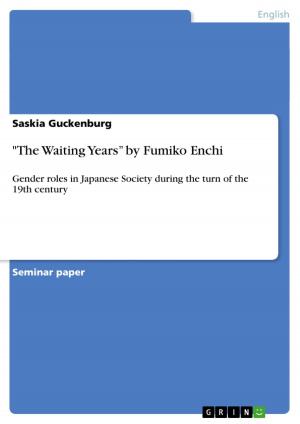In a mere of 20 years the Spaniards were forced out from the Latin American continent ant the different colonies gained their independence. How could this happen?
Nonfiction, Reference & Language, Foreign Languages, Portuguese| Author: | Renate Bagossy | ISBN: | 9783638287333 |
| Publisher: | GRIN Publishing | Publication: | July 1, 2004 |
| Imprint: | GRIN Publishing | Language: | English |
| Author: | Renate Bagossy |
| ISBN: | 9783638287333 |
| Publisher: | GRIN Publishing |
| Publication: | July 1, 2004 |
| Imprint: | GRIN Publishing |
| Language: | English |
Essay from the year 2002 in the subject Romance Languages - Latin American Studies, grade: 2 (B), University College Cork (History), course: Spanish America, language: English, abstract: There were several reasons which caused the independence movement of the Latin American colonies. There was not only one reason but a whole development over decades and even centuries which led to the independent struggles. Therefore it would not be correct to start the explanation with the rebellions at the beginning of the nineteenth century but we must go back in history a great deal to find out about the backgrounds, about the reasons, why there was such a dissatisfaction, such an unhappiness in the Latin American population. There was a shutter reason but a lot of more or less small factors also played an important role. The mixture of the races led to the development of the mestizos, mulatos and zambos. The Spaniards who were born in the New World, the Creoles, were also seen as something different form Spaniards. There was constant tension between Spaniards and people who were born on the American continent. In fact the whole Spanish administration was undermined from the beginning, as the Creoles were not allowed to take part in it. The weakening of the Spanish Kings and the motherland in general also played an important role. 'The American and French revolution in the late 1700s helped to ignite a revolt against European colonial powers.'1 And finally the fact that at the beginning of the nineteenth century two different people (Joseph Bonaparte and Ferdinand VII) seemed to gave orders to the administration of the motherland and the colonies, which caused confusion and disagreement in South America. So the reaction on the restorment of Ferdinand as absolute monarch was not the only reason for the final rebellions at the beginning of the nineteenth century, but there were a lot of earlier tensions which by this time came to a high point.
Essay from the year 2002 in the subject Romance Languages - Latin American Studies, grade: 2 (B), University College Cork (History), course: Spanish America, language: English, abstract: There were several reasons which caused the independence movement of the Latin American colonies. There was not only one reason but a whole development over decades and even centuries which led to the independent struggles. Therefore it would not be correct to start the explanation with the rebellions at the beginning of the nineteenth century but we must go back in history a great deal to find out about the backgrounds, about the reasons, why there was such a dissatisfaction, such an unhappiness in the Latin American population. There was a shutter reason but a lot of more or less small factors also played an important role. The mixture of the races led to the development of the mestizos, mulatos and zambos. The Spaniards who were born in the New World, the Creoles, were also seen as something different form Spaniards. There was constant tension between Spaniards and people who were born on the American continent. In fact the whole Spanish administration was undermined from the beginning, as the Creoles were not allowed to take part in it. The weakening of the Spanish Kings and the motherland in general also played an important role. 'The American and French revolution in the late 1700s helped to ignite a revolt against European colonial powers.'1 And finally the fact that at the beginning of the nineteenth century two different people (Joseph Bonaparte and Ferdinand VII) seemed to gave orders to the administration of the motherland and the colonies, which caused confusion and disagreement in South America. So the reaction on the restorment of Ferdinand as absolute monarch was not the only reason for the final rebellions at the beginning of the nineteenth century, but there were a lot of earlier tensions which by this time came to a high point.















